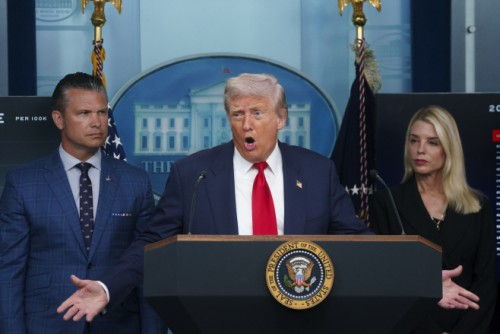 |
| U.S. President Donald Trump (center) speaks at the White House in Washington, D.C., on August 11, outlining measures to combat crime in the capital, as Defense Secretary Pete Hegseth (right) and Attorney General Pam Bondi listen. / Source: EPA·Yonhap News |
U.S. President Donald Trump announced on August 11 that he will place the Washington, D.C., Metropolitan Police Department under direct federal control, deploy 800 National Guard troops to the capital, and, if necessary, bring in the military to combat crime.
Speaking at a White House press briefing, Trump said he was invoking relevant legal provisions to restore “law, order, and public safety” in the capital. “We will end sanctuary cities because they have become havens for illegal alien gang members,” he declared, vowing to coordinate all law enforcement levels and deploy a strong police presence citywide.
Trump warned that other major cities such as New York, Los Angeles, and Chicago — all Democratic strongholds with high violent crime rates — should take “self-cleanup” measures or face similar federal intervention. Defense Secretary Pete Hegseth compared the D.C. deployment to troop placements at the southern border, saying the Pentagon is ready to send additional forces if needed.
Earlier on social media, Trump wrote, “Washington, D.C., will be liberated today. Crime, barbarism, filth, and human garbage will disappear,” adding that the “era of innocent people being mercilessly killed or harmed is over.”
According to gun safety advocacy group Everytown for Gun Safety, D.C. had the third-highest gun homicide rate among U.S. cities with populations over 500,000 in 2023, with at least 225 to as many as 274 firearm deaths — the highest in two decades.
While federal data shows violent crime in D.C. fell 35% last year and 26% in the first seven months of 2025, Reuters noted gun violence remains a pressing issue. D.C. Mayor Muriel Bowser, a Democrat, countered Trump’s claim that crime is “unchecked,” noting last year’s violent crime rate was the lowest in 30 years, but said she would cooperate with federal authorities given the president’s legal powers.
Under the Home Rule Act, D.C. operates with locally elected officials but ultimate authority lies with Congress. Invoking Section 740 of the Act, Trump declared a “public safety emergency,” allowing him to control the police for 30 days.
The administration also cut federal urban security funding for the D.C. metropolitan area by $20 million, a 44% reduction from last year. Trump added that a decision on reclassifying marijuana from a Schedule I to Schedule III controlled substance — which would ease sales — would be made within weeks, calling the issue “very complicated” despite hearing positive reports about its medical use.
Most Read
-
1
-
2
-
3
-
4
-
5
-
6
-
7





















